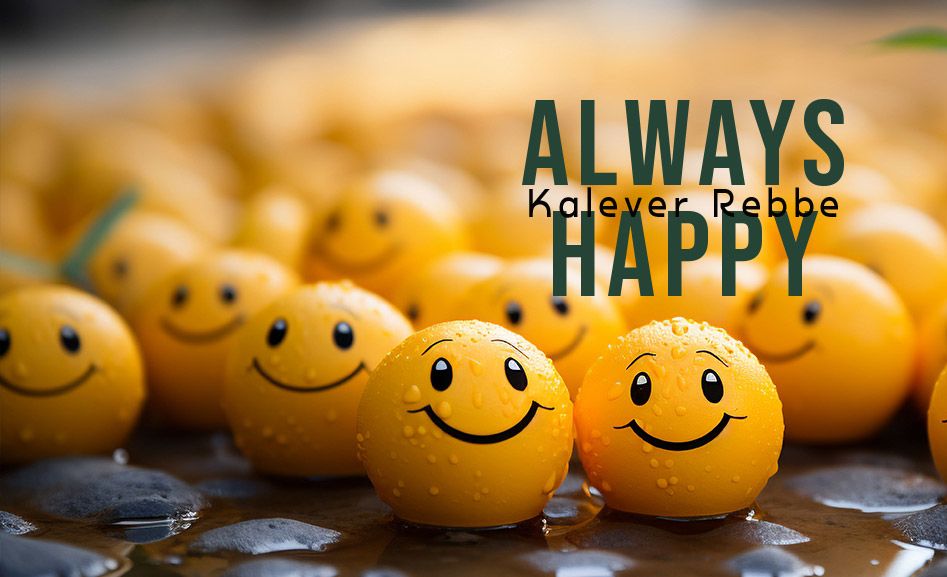
The Gift of Enthusiasm
Wouldn't we love to serve Hashem with enthusiasm, to pray with devotion and to learn Torah with a burning desire? How do we attain the gift of enthusiasm?

Translated by Rabbi Lazer Brody
Wouldn't we love to serve Hashem with enthusiasm, to pray with devotion and to learn Torah with a burning desire? How do we attain the gift of enthusiasm, which fuels our vitality and keeps us constantly happy and bright?
The Gemara describes Rebbe Akiva's praying and says that he'd jump around from one corner of the synagogue to the opposite corner, for he'd pray with so much enthusiasm. Rebbe Levi Yitzchak of Berditchev would pray as if his entire body and soul were on fire. The great tzaddikim were ever so enthusiastic about every single mitzva they could perform.
How do we attain such enthusiasm of the heart? Rebbe Nachman explains that the more and faster the brain moves, the more heat is created. What's more, the Hebrew word for brain, moach, is simply the Hebrew word for heat, choam, spelled backwards.
A person with a quick mind is enthusiastic. A person with a slow mind is not. Rebbe Nachman explains that movement creates heat. This principle works on both a spiritual and a material level. For example, the more a  person exercises – in other words, the more he moves his body – the more body heat he creates. We also see that when a person thinks intensely, beads of perspiration break out on his forehead. The more he thinks, the more heat he produces. But, when a person is sleeping, even when the bedroom's temperature is comfortable, he must still cover himself with a blanket for his immobile body is producing much less heat than when he's awake.
person exercises – in other words, the more he moves his body – the more body heat he creates. We also see that when a person thinks intensely, beads of perspiration break out on his forehead. The more he thinks, the more heat he produces. But, when a person is sleeping, even when the bedroom's temperature is comfortable, he must still cover himself with a blanket for his immobile body is producing much less heat than when he's awake.
The more a person ponders the magnificence of Hashem and Torah, the more his mind races, the more inner spiritual heat he produces and the more his heart burns for Hashem.
The mind has a profound effect on the body. Even if a person is immobile and sleeping, if he dreams that he's running a race, he'll wake up moist with perspiration.
So what are we leading up to? The more a person thinks about lewd and forbidden images, the more he'll fan the fires of lust within him, and the more his heart and body will burn with unholiness, the opposite of Hashem and Torah.
Sexual lust is the opposite of Divine abundance. Divine abundance given to a person brings the gift of intelligence, enabling the mind to race immediately in enthusiasm for Hashem. Any blemish in personal holiness extinguishes the flame of enthusiasm for Hashem, negating and forfeiting the Divine abundance.
Rebbe Nachman once immersed in a frozen mikva in the middle of a Ukranian winter, and remained in the water for more than thirty minutes. Any other person, even a powerhouse with the strongest heart, would risk his life doing such a thing. But in light of what we've learned now, Rebbe Nachman merited the Divine abundance that enabled his mind to race in pondering Hashem, to the extent that his heart was ablaze in yearning for Hashem. This kept him warm. It would not have been possible without Rebbe Nachman's impeccable personal holiness.
Rebbe Nachman explains that one attains the level of personal holiness that merits Divine abundance by sanctifying his mouth, both nostrils, both eyes and both ears.
Every person has a seven-stemmed Menorah, like the type that burned in the Holy Temple, carved on his face. Here's how: Imagine that the mouth is the central stem; adjacent to it on each side are the nostrils. The next two outer stems on each side of the nostrils are the eyes. The next two outer stems on each side of the eyes are the ears. According to the Zohar, the purity of the brain depends on the purity of the "Menorah", the body's seven accesses to the brain – mouth, two nostrils, two eyes and two ears.
The seven accesses to the brain upload information to the brain. Everything a person sees, hears, smells and tastes becomes recorded on his brain and consequently influences the brain.
The purity of the brain is enhanced when the brain absorbs words of Torah via the ears. The opposite is true when the ears transfer epithets, vulgar language and slander to the brain. One can easily understand how the brain is sanctified when the eye sees the holy letters of Torah, or the contrary when the eye sees lewd images. Listening to the melodies composed and performed by upright musicians who yearn for Hashem enhance the purity of the brain, whereas listening to acid rock composed and performed by people under the influence of drugs contaminate the brain.
A person is his mind; your brain is the real you. The mind is what differentiates between people. A person is the product of the content of his brain. A new input to the brain virtually changes a person. We have witnessed countless times, all over the globe, how a person has dramatically changed simply by reading an emuna book or listening to an emuna CD.
With today's computer technology, the above principle is readily understood. The brain is like a computer; it functions according to the programs and data in its memory bank. The most sophisticated computer in the world won't be able to edit a photograph if it doesn't have a program in its memory for photo editing. In addition, even if the best computer is equipped with the best programs and ample memory capacity, it won't function properly – or could be destroyed altogether – if it's infected by viruses. In like manner, a person functions according to the content of his brain. He too must be careful to guard against "viruses" – harmful content that destroy his judgment and thought process.
With the above in mind, we guard the brain from unwholesome input, and at the same time, feed our minds with as much Torah and holiness as we can, we purify the heart. A pure heart is the best climate for kindling the flames of holiness, enabling us to merit the wonderful gift of enthusiasm. Nothing makes a person happier than serving Hashem with enthusiasm.







Tell us what you think!
Thank you for your comment!
It will be published after approval by the Editor.